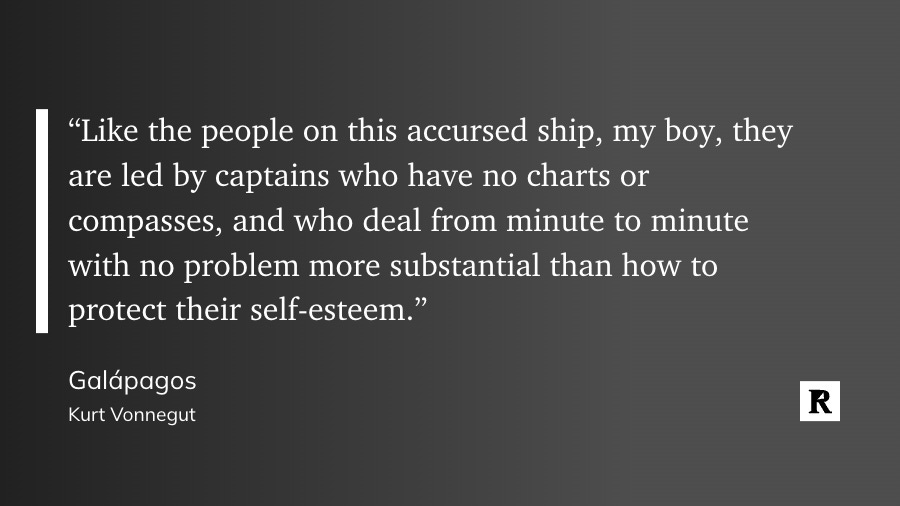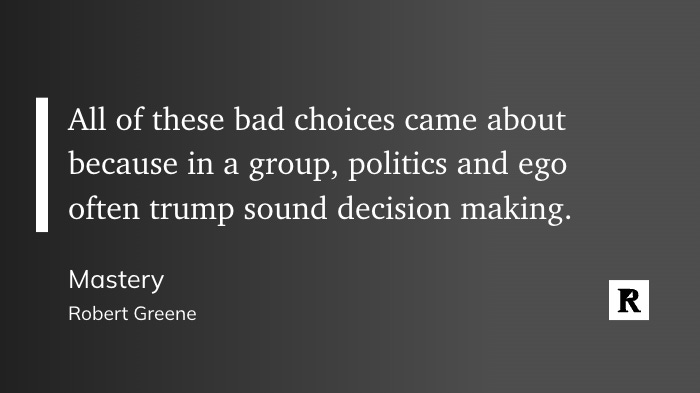🎶 Music for the journey, to remind us of these ideas at a later date…Why is it important to talk about Thucydides, or any of this 'old Greek stuff' when there's immediate disaster and tragedy at hand?
Philosophizing in times of trauma makes me think how Socrates lived nearly half his life during the terrible Peloponnesian War, where morally inept leaders became a snowballing problem that eventually toppled the Athenian Empire. Two interesting thoughts come to mind:
Socrates survived plague, war as a soldier, and the downfall and subsequent restoration of democracy in his home of Athens, but in the end it was his fellow citizens who were rallied to condemn him to death.
Beware showmanship of any kind in leaders - only actions matter
Cleon insulted his political rivals, and Athenians “found his unusually brash style more entertaining than the polished rhetoric of established statesmen.” Soon enough, Cleon’s “outlandish behavior” became the norm in the Assembly, and “Genuine statesmen gave way to demagogues, who stoked the fear and anger of the citizens and pandered to their greed and other vices.
Opportunities to learn from history are plentiful these days, and Thucydides was among the first to point this out. There's so much to learn from the Peloponnesian War and I've written about it before, but that didn't seem to solve world peace so I'm revisiting some of Thucydides’ core ideas in what will likely be an ongoing series.1
An idea at the bedrock of Thucydides' thought is that we should make decisions based on observed reality, not on the explanations people tell us. We must seek to know true motivations if we want to make sense of the world. This is true at the individual level and at the state level.
Propaganda was a problem 2,500 years ago in Ancient Athens, it was a problem a long time ago in a galaxy far, far away2 and might still be a problem today. Simple stories sway history, and it works every time if people don't feel bothered to think for themselves.
To learn from history, we must first seek to understand what actually happened.
There are two ways to be fooled: one is to believe what isn’t true, the other is to refuse to believe what is true.
Soren Kierkegaard
Laying the Groundwork
Thucydides' historical masterpiece begins with a deep dive into his own motivations and the nature of human intentions. The driving force behind the endeavor of writing this massive history is his belief that the Peloponnesian War was the most significant and tragic conflict in Greek history, and he hopes understanding its true cause might help prevent something similar from happening again.
To substantiate his claim, Thucydides revisits hundreds of years of Greek history, reaching back as far as the Trojan War, to demonstrate that this recent war involved and impacted more people than any other in recorded history. And by discussing all this up front in rigorous detail3 Thucydides is highlighting how this is NOT what most other people do.
The absence of romance in my history will, I fear, detract somewhat from its interest; but if it be judged useful by those inquirers who desire an exact knowledge of the past as an aid to the understanding of the future, which in the course of human things must resemble if it does not reflect it, I shall be content. In fine, I have written my work, not as an essay which is to win the applause of the moment, but as a possession for all time.
Thucydides
Thucydides focuses on the motivations behind the actions and decisions that shape history, chronicling not only events but why people do what they do. People are too easily satisfied with surface narratives, he wanted to explore psychology rather than heroic storytelling.
Life is abundant with people eager to sound like they know what they are talking about - at any cost - and way too many of these people become "leaders" because they learned the bravado of heroes. Way too often this results in unnecessary suffering, and for Thucydides this wasn't philosophy but battlefield recon gained first-hand.
If we take the time to understand true motivations we can find patterns, and this is how we turn philosophy and history into actionable advice.
The 3 Motivations
“The real cause I consider to be the one that was formally most kept out of sight.”
Thucydides
Thucydides identified that every human decision springs from three core motivations. All sorts of stories and narratives are created to explain why something happened, but there are really only three motivators:
Fear — something a person hopes to avoid
Prestige / Honor — how a person hopes to be perceived
Profit / Interest — something a person hopes to gain
Like many large scale conflicts, the Peloponnesian War did not begin with an epic battle or hostile invasion, but rather a minor dispute that didn't involve Athens or Sparta at all. The Greek colonies of Corinth and Corcyra were in an escalating conflict over coastal territories in western Greece, sparked by civil unrest in the tiny colony of Epidamnus. Both appealed to Athens, the strongest navy in the Aegean at the time, to either help them win or else to beg them to stay neutral.
When the Corcyran envoy spoke at Athens, they appealed to them along these three motivations:
They know Athens fears an inevitable coming war with Sparta, because Sparta is afraid of Athens' navy. Corcyra has the second best navy in the area so they would be a good ally.
Athens is praised as the most powerful navy in Hellas and, being so mighty, of course both sides would be interested in their alliance.
Athens will profit from helping Corcyra, gaining a formidable ally and dismaying their enemies
This framework is seen repeatedly throughout Thucydides’ History and, indeed, it is indeed Sparta's fear of growing Athenian naval power that Thucydides ultimately cites as the cause of the war.
This Tri-part4 Motivation Lens can be used to examine much more than ancient history. To choose something trendy and zeitgeisty, let's think about Netflix. What do you think was actually driving the decision making and leadership at a company like Netflix in its early days and as it began to grow? Of course becoming a successful business was one motivation, but beyond that, what actually motivated some of the choices they made along the way?
For example, when Netflix shifted from DVD to streaming - mostly the history focuses on the innovative shift in technology this represented, but why was this route chosen?
Netflix was, perhaps:
Afraid Blockbuster might copy their model and needed to innovate
Hoping to be seen as a visionary company that 'saw the future'
Not unaware of the enormous financial potential of dominating this brand new market
This is the cocktail of thoughts that spawns big ideas and bold choices… And we can give a review like this a snazzy name, like the the "Motivation Audit Framework."
The next time you're trying to understand a confusing decision, on behalf of yourself or someone else, ask:
What is there to be afraid of by not taking action?
How do the interested parties want or need to be seen by others?
What concrete benefits are there to be gained?
Here we've begun applying the Socratic Method to human motivations.
Reality Over Narrative
"Most people, in fact, will not take the trouble in finding out the truth, but are much more inclined to accept the first story they hear."
Thucydides
History is full of propaganda written by the winners and survivors. Human psychology needs "things" to "make sense" - we want a story, a narrative that makes sense of things and puts them in order for us. Unfortunately, that's not how reality seems to unfold.
We, the people, have always been narrative-making machines - we instinctively, instantly, create stories to make sense of events, rather than suspending judgement until all the facts are in. I'd go so far as to say that creating stories from disparate facts is a human super power, and quite addictive. Thucydides saw this as well and called it out. We must always be mindful to observe what people are actually doing and how they act, not just what they say and tell us they are doing.5
We, the people, have always struggled with the discipline of hard observation. Increasingly, we seem to prefer a comforting narrative over a hard truth.
Now, of course, this is a 2,000+ year old observation and somewhat obvious, but the fact is we still fail to account for this all the time, preferring to 'drink the kool-aid' and believe our own spin rather than check the facts. Think back a few years to Google's first foray into a wearable "Google Glass" - this endeavor failed spectacularly because Google believed their own hype and narrative about a need for "wearable tech" and "augmented reality" rather than observing actual human behavior.
Let's analyze this as Thucydides might
Google believed a narrative that people were hungry for more seamless tech integration into their daily lives, so they built a device that could help people accomplish this (Google Glasses)
In reality, there was no stated demand for this, and the product Google released actually created new problems for people, making them feel socially awkward when using the device and like their privacy was being violated
The real truth on display here ("Reality over narrative") is that social comfort must be accounted for in technological innovation6
I think the more sinister phrasing of this idea is the concept of "controlling the narrative." This idea is heard at all levels and walks of life and, even with the best of intentions, it has only one goal - to force reality to conform to a narrative. This is Propaganda and there are few ideas more dangerous to our society than letting these things go unquestioned.
You should question everything you’re told, and you should run from anyone who encourages otherwise. False narrative is the ONLY tool that's ever been used to justify genocide and worse.
Thucydidean Skepticism
So how do we guard against this in our own lives?
Before accepting any explanation (including your own) do the following:
Separate actions from explanations - what actually, indisputably happened?
Look for patterns, not incidents - is this a repeat of any previous behavior?
Ask, "who benefits from this narrative?" - cui bono?
Always, always test assumptions against reality via this dialectic, before taking action.
In layman's terms that means "ask questions!" Don't just accept the first explanation you're given, especially when it seems rather convenient or fits together too nicely.
True reality is messy, but it is infinitely preferable to living a lie.
So many people on this planet have aspirations that don't run any deeper than "I must save face and convince others I'm cool." It is an odd factor of humanity that we find it less daunting to try to change and control all of reality rather than address a misalignment in our own motivations.
And alignment IS possible, let’s think about a company like Pixar. Pixar needs money to stay in business, and the work that generates profit for Pixar (i.e. writing and animating movies) is done by artists who surely want to feel creatively fulfilled and engaged, so they must channel these feelings into creating movies that audiences will pay real money to watch.
Pixar's success comes from mastering this integration. Translated through Thucydides' 3 Motivations we might say something like: "The artists want to tell meaningful stories (prestige) but also want job security (fear) and the possibility of career advancement one day (profit)" so a desire to balance artistic integrity with commercial viability is inherent both in the motivations of the shareholders and in the motivations of the artists actually doing the work.
Pixar doesn't just do a focus group test or analyze trends, they synthesize multiple layers of the true motivations of the people who actually make up the company. When you can align these things, its hard to fail.
So, to summarize this into something you can put into practice:
Always assess true motivations (The Big 3) and, as the saying goes, "Actions speak louder than words"
Analyze "What paths forward account for BOTH these potential motivations and observable reality?"
Phronesis (i.e. practical wisdom, common sense) should always be valued above rhetoric
Philosophical Vision
Perhaps Thucydidean Skepticism is a phrase you just cannot ever, in a million years, picture yourself saying, and maybe "The Thucydides Lens" isn't a whole lot better.
It is of course "just" critical thinking for the most part, to seek to understand other people's motives and to value what you see with your own eyes over what other people tell you. And yet, even knowing these things, we often don't put the exercise into full practice.
Perhaps we can call this push into deeper observations "Philosophical Vision." The desire to see into one's thoughts and not just take them at face value.
But why bother with all this thinking?
Well, for one thing, it is how you remain free. Free from manipulation, and able to see through surface narratives and propaganda to actual motivations.
It's also how you gain Clarity, which we all know is a prerequisite for meaningful action. When you see the picture clearly you can make decisions confidently.
It might also make us more compassionate and empathetic humans, as we better understand the very human and relatable motivations that drive the decisions every person is making, every day, all around us.
Understanding that the 3 Motivations are at work in everyone, including ourselves, means we can:
Design real solutions that take human nature into account
Communicate in ways that actually motivate change
Build meaningful relationships based on an authentic understanding of others
Create actual value in this world, by solving real problems instead of invented and self-serving ones
I for a long time thought most of this was too obvious to need saying, but we seem to believe in Truth less and less every day… Only someone armed with these skills, like Philosophical Vision, can hope to alleviate the problems and suffering of today.
Conclusion
If this is all obvious, good :)
Deliberate practice and refinement of the basics never hurt anyone.
For the next 30 days, put your Philosophical Vision muscles into practice (eyes are muscles, right?) and challenge yourself.
Here are some extremely simple things to try, do them all and Apollo and Athena will smile a little brighter on us all:
Days 1-7: Think about one important decision you made recently (or ever.) How might each of the 3 Motivations (Fear, Honor/Prestige, Interest/Profit) have been at play? Be very honest with yourself.
Days 8-15: Take a moment to think about Thucydides each time you catch yourself ingesting the news. How would he think about this event?
Days 16 - 23: At the end of each day, take 30 seconds to reflect - were there any moments where Philosophical Vision proved useful today?
Days 24 - 30/1: Tell someone you know about Thucydides and Philosophical Vision.
Bonus: Why not try reading the first 2-3 pages of Book 1 of Thucydides' History. (This physical copy is absolutely the coolest thing you can get.)
The goal is not to memorize the events of the Peloponnesian War - though these are morbidly entertaining in their own right. Rather, we want to understand the thinking that led up to these tragic events, so we can hopefully catch it in advance next time… When I ramble on about how everyone should read Thucydides or learn about the Peloponnesian War, this is what I mean.
The patterns Thucydides discovered haven't changed. The world stage has just gotten bigger. Like a game of chess (or Jenga 🤔) each move requires more and more forethought as the endgame approaches.
As always, we're not here to 'memorize philosophy' - the idea is to sharpen one's mind on the whetstone of philosophy, so we can more incisively navigate the complexities of this modern world.
Do you consider yourself a philosophical person?
If you've met me, you've likely heard me say something along the lines of "You should read Thucydides' History of the Peloponnesian War, it’s really great!" And as this long string of strange syllables tumbles out of my mouth I can already see I’ve pitched this wrong. These are my attempts to correct that… I often wonder, if Thucydides had simply had an easier name to pronounce would we as a society have learned a whole lot more from history over the last 2,000 years? 🤔
The recent Ghorman Massacre arc in Andor is a chillingly perfect account of how the game plan works.
Scholars often refer to the start of Book 1 as 'The Archaeology'
Because this is easier than saying/typing Thucydides, which is already going to appear way too much in this article.
I know, dear reader, this seems obvious but take a look around the world today and tell me if this is a problem we've since overcome.
One would be right to ask, did Big Tech actually acknowledge this truth or learn this lesson? A similar pattern can be seen in many recent tech ventures - despite their love of extreme capitalism, they sure LOVE getting billions of dollars to build things the market is NOT asking for… 🤔














Good points all! Can you put this on a Billboard in Times Square?! While it’s funny to think if he had had a different name, things might be different; it’s also so true. I think you’re on to something there!
Thanks, Philip...it does all seem like common sense, doesn't it...but unfortunately, it doesn't always seem to be all that common...BTW, really enjoy the music you created for the end of this piece. Is it a good time to reconnect about all things female piratical and musical? I think you have my email...